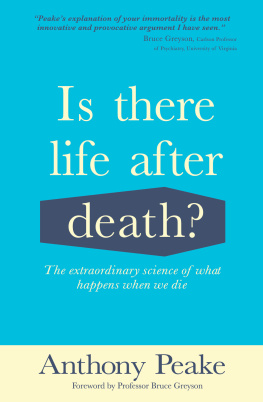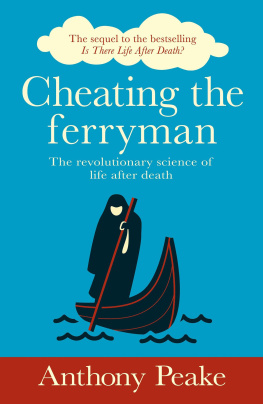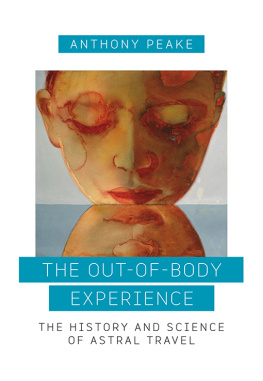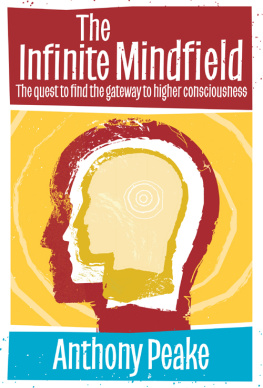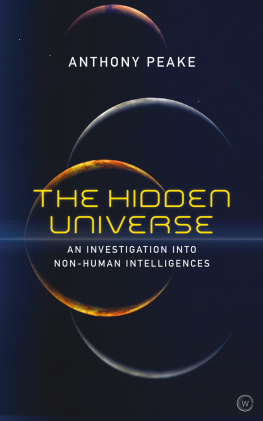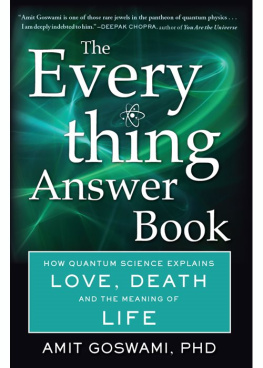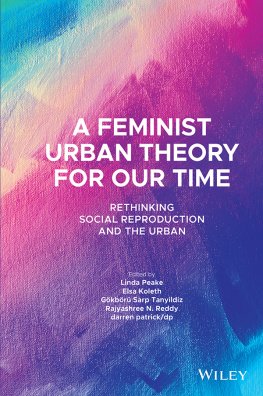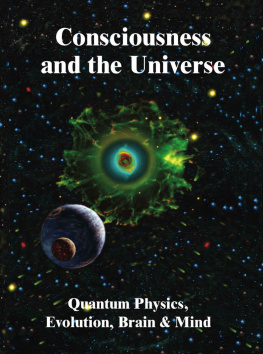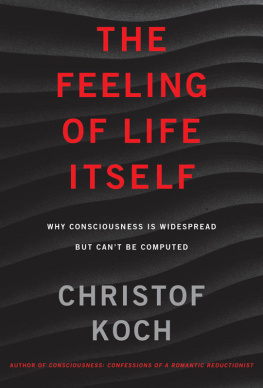
Foreword
This book presents a most astounding and provocative model for understanding the one inescapable event in your life: your death. You might expect a book entitled Is There Life After Death? to discuss your afterlife in another realm, or perhaps reincarnated into a different body. But in fact Tony Peake does not think that we survive the death of our bodies; he argues instead that we do not die at all, that bodily death as we usually think of it is in fact not possible. Presenting insights from contemporary neuroscience and quantum physics as well as ancient cosmologies and mystical traditions, Peake presents a coherent picture of a universe that literally requires you to be immortal.
What Peake suggests is that when we appear to others to die, we in fact begin our lives all over again and again and again and again in seemingly endless succession. As preposterous as this assertion may seem, Peake finds persuasive evidence to support it from a wide variety of sources but most of all from our common, everyday experiences. How often have you had a sensation that you were re-living an event for a second time? How often have you had a correct hunch about something that was about to happen? Are these mere illusions? Peake suggests that they are glimpses of what is really going on: that you are in fact reliving a life you have already lived perhaps many, many times.
But why is it, then, that we do not remember living this life before? Here Peake draws on ancient teachings that, at the approach of death, our consciousness splits into a lower self that will re-live the life without any memory of it, and a higher self that retains the memory but remains in the background. How many times have you had the feeling that you have been guided by a force that knows everything about you? How many times have you heard a voice guiding you in your daily life? Are these mere illusions? Peake suggests something much simpler: that they are brief intuitions of your higher self breaking through.
Does all this sound like science fiction or like religious babble? Peake argues persuasively that all of this is not only compatible with contemporary science, but indeed prescribed by it. You will read in this book about Schrdingers cat-in-a-box thought experiment, about the Copenhagen and Many Worlds Interpretations of quantum physics, about Minkowski time-lines, and about the quantum Zeno effect. From these concepts, accepted by physicists for most of the past century, Peake shows how the physical world around you is completely dependent on your perception of it. If your consciousness ceased to exist, so would your universe, along with any record of its existence. Thus, this understanding of quantum physics demands that you never die.
You may protest now that this is absurd, that you have certainly known people who died. In your universe, other people can die; but in their universes they continue to live. And likewise you will surely die in other peoples universes; but just as surely, you cannot die in your own universe. A corollary to this model is that your life is not a brief and meaningless hiccup in the course of eternity. In fact, Peake argues that you yourself are the very centre of your universe and for you, that is the only universe there is.
How then do we explain your illusion that you live for one finite lifetime? Here Peake examines what happens in the brain as death approaches. You will read about the common features of near-death experiences: the slowing of time, the encounter with an apparently omniscient entity, and a review of your entire life; about brain stimulation studies, evolution, Freudian slips and dj vu, epilepsy and schizophrenia. Peake shows that the slowing of your sense of time dictated by chemical changes in your dying brain allows you to re-experience your life all over again in seconds, in someone elses universe, but in another full life-time in yours. While an observer may fix the time of your death in his or her world, the passage of time in your universe is changing, so that you never actually reach the point of death, but instead you re-live your life in what for you is real time. Each time you approach the end of your life, your time slows down and your higher self guides you into a re-experience of your entire life, but this time with the ability to make changes, allowing for your evolution over the course of your lifetimes.
You may be asking yourself at this point who Tony Peake is to expect you to accept such outlandish ideas. In fact, none of these ideas are his: what he has done is to pull together in a most creative way the puzzle pieces that were there all along. You will find in this book evidence from a wide range of sources, from quantum physics to neurophysiology, from clinical psychiatry to various mystical traditions. But Peake does not appeal to the authority of these sources; they are merely the frameworks to help you understand your own experience. The ultimate authority to which Peake appeals is your own personal experience. He challenges you to think about those coincidences in life that may in fact be the fingerprints of something else.
Your own consciousness is at once the most complex problem in the universe and also the simplest, most self-evident fact. Likewise, the picture that Peake draws in this book of what happens at death is at once incredibly complex and also incredibly simple and self-evident. Peakes explanation of your immortality is the most innovative and provocative argument I have seen. The question is whether that is the way your universe really works. And as this book shows, that answer is up to you.
BRUCE GREYSON, M.D.
Charlottesville, Virginia
January 31, 2006
Prologue
We are the music makers
And we are the dreamers of dreams
Wandering by lone sea-breakers
And sitting by desolate streams;
World-losers and world forsakers,
On whom the pale moon gleams;
Yet we are the movers and shakers
Of the world forever, it seems.
Arthur OShaughnessy
What made you pick up this book? What series of events brought about the circumstances whereby you are reading these words? And why this book and not the dozens of others that you could have chosen? It is possible that you were guided by a power that you are, at present, only vaguely aware of a power that has guided your life to this point, to have you looking down on this page and wondering what these words mean.
Its all to do with the one certainty that your life holds that you will, one day, die. Death is not something that only happens to other people. As sure as you are breathing now, you will, at some indeterminate time in the future, cease to exist. Whatever is doing the self-reflection at this moment in time, whatever it is that is processing these black lines on white paper into concepts and ideas, it will suddenly cease to be. No memories, no feelings, no thoughts, just blank. A whole lifetime of learning and decision-making snuffed out in the blink of an eye. To exist no more from that moment forth until the last dying embers of the universe. You did not exist for billions of years and you will not exist again for billions of years. In relative terms, you existed for a ridiculously short amount of time and then you are gone.
So what is the point of your life and what can be the reason for conscious matter to come about only to disappear? For some philosophers and psychologists you are not really conscious at all. You are fooling yourself into believing that you exist it is a giant self-deception. However, we know that we are conscious and we also know that we are, in some way, not part of the physical world with which we interact. We also see as a tragic waste the fact that we spend our lives striving to acquire knowledge, gaining wisdom, loving and being loved and learning from our mistakes only to disappear as if we never existed. Surely it would be better if human beings were not conscious because to be not conscious is to not be aware of ones own mortality? However, all may not be what it seems. There may after all be a plan for you and a reason for your existence. There is strong evidence to show that your life is for a reason and that you, as a conscious entity, do not die but will go on learning and growing.
Next page
